MPL Surgery Restores Stability and Comfort
Expert Kneecap (MPL) Surgery for Dogs
Your dog can’t tell you if surgery is needed - but SurgiPet experts can!
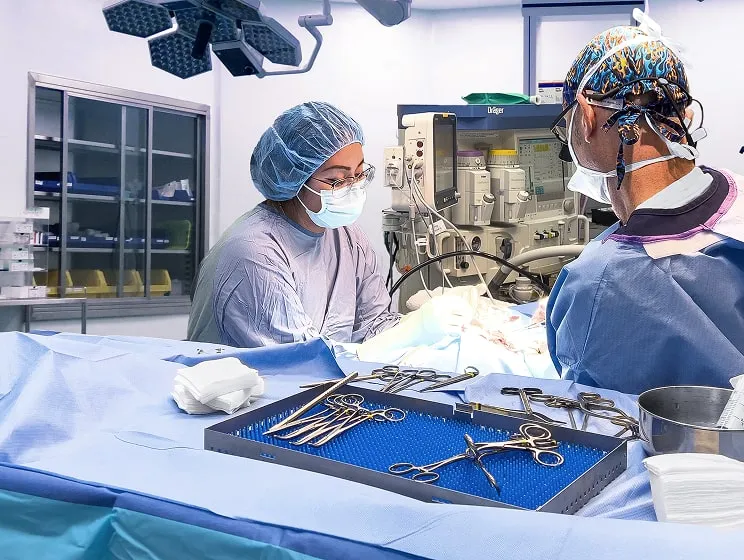
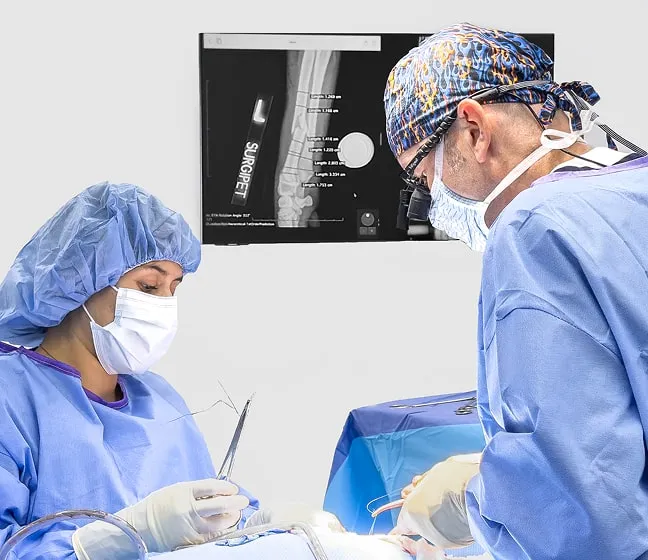
Understanding Dog MPL Surgery
Luxating patella is a medical term for a dislocated kneecap. Dislocated kneecap describes a condition when the dog's kneecap (same as your kneecap) pops out of place. This problem is more common in small and toy breed dogs, although can also occur in young, large-breed dogs.
MPL (Medial Patella Luxation) correction surgery is a procedure aimed at returning kneecap to its natural position.
 Removes pain and skipping/hopping gait.
Removes pain and skipping/hopping gait. Prevents further joint damage.
Prevents further joint damage. Proven success for active and senior dogs alike.
Proven success for active and senior dogs alike.
Dog MPL Surgery Serving San Diego, Orange County, Los Angeles, and Riverside
Dog MPL Surgery Experts
When your dog needs MPL surgery, experience matters. Our surgical team routinely evaluates dogs with patella luxation. The first step is always to assess whether surgery is truly needed. You can trust us to recommend MPL surgery only when it’s the right decision for your dog.
The all-inclusive package fee for dog MPL surgery at SurgiPet covers everything from the initial consultation to post-surgical rechecks and x-rays and offers 30-40% savings compared to large veterinary hospitals' charges.

Your Dog’s MPL Surgery Journey
Initial Consultation
We don’t rush - each consultation includes a full history, a careful hands-on exam of your dog, and time to talk through your goals, concerns, and what matters most to you.
Surgery Day
Experience counts! Our surgeon has performed thousands of orthopedic surgeries over the course of his professional career. With that experience, your dog is in the best hands.
Going Home
Your pet will go home comfortable, fully recovered from anesthesia, and able to walk. You will receive printed instructions, and dedicated post-operative support is available 7 days a week-including weekends.
Providing peace of mind and comfort
What to Expect After MPL Surgery
Most dogs are able to walk with sling support the same day after surgery. Recovery typically takes 4-8 weeks, with steady improvement in strength, comfort, and mobility.
Our team provides detailed home care instructions and support 7 days a week to guide you through every step of healing.
Tips for Recovery:
✔ Follow all activity and exercise restrictions closely.
✔ Return for scheduled rechecks - they’re covered in the surgery fee.
✔ Contact us with any concerns - the surgeon is just a phone call away.

The Safest pet anesthesia. For Every Pet. In Every way.
Ensure your pet’s safety with expert anesthesia care tailored to their specific needs, managed by a board-certified veterinary anesthesiologist.
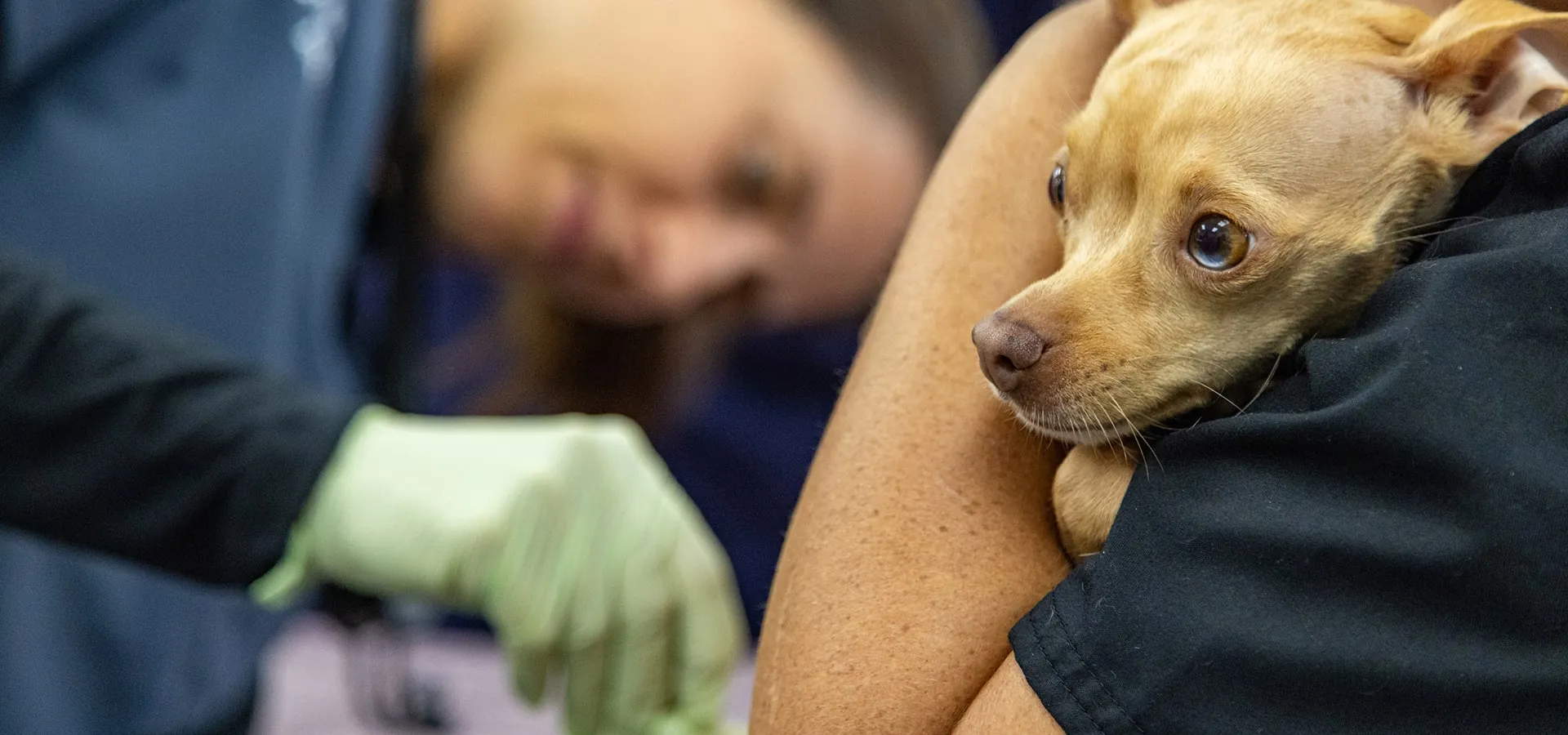
Meet the Dedicated Team Behind Our Success

Dr. Wypart has twenty years of experience with various soft tissue and orthopedic surgeries. After graduating from veterinary school, he completed rigorous specialty training in veterinary surgery.
Dr. Wypart is a highly skilled veterinarian with over two decades of experience in orthopedic and soft tissue surgery. He earned his veterinary degree from the Warsaw University of Life Sciences and completed advanced specialty training in veterinary surgery at the European University of Environmental and Life Sciences. His clinical skills have been shaped by extensive international practice across Europe and North America.
Since relocating to San Diego in 2012, Dr. Wypart has become known for his surgical expertise, particularly in orthopedic procedures involving joint trauma, complex fractures, and advanced soft tissue techniques. A member of the Veterinary Orthopedic Society, he has performed over 1,000 successful TPLO surgeries and remains actively engaged in continuing education focused on fracture management, joint disease, and advanced soft tissue procedures.
Dr. Wypart founded SurgiPet to make high-quality, specialized surgical care more accessible and affordable for pets in San Diego and surrounding communities, with a focus on procedures like TPLO for cranial cruciate ligament repair.
Outside of surgery, Dr. Wypart enjoys growing vegetables in his backyard, perfecting new soup recipes, and hiking Potato Chip Mountain.
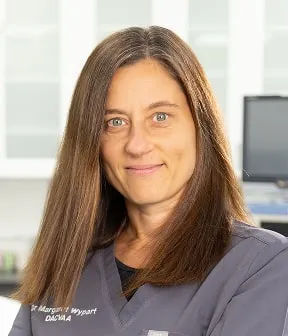
Dr. Margaret Wypart, DACVAA, is a board-certified veterinary anesthesiologist with over fifteen years of experience. She ensures pets stay safe, stable, and comfortable - just as human anesthesiologists do for people.
Dr. Margaret Wypart, DACVAA is the Medical Director and co-founder of SurgiPet, where she leads the development of advanced anesthesia protocols to ensure surgical safety and comfort for every patient. She has been dedicated to veterinary anesthesia for over a decade, having completed a competitive 3-year residency in Anesthesia and Pain Management at the University of Pennsylvania, an Ivy League school known for its highly respected veterinary training program.
One of only a few board-certified veterinary anesthesiologists practicing in San Diego County, Dr. Wypart’s clinical focus is entirely on keeping pets safe and pain-free during surgery. She specializes in ultrasound-guided nerve blocks to minimize discomfort and reduce reliance on systemic medications—allowing pets to wake up more smoothly and return home the same day. Her approach follows the principles of Enhanced Recovery After Surgery (ERAS), emphasizing proactive pain control, early mobility, and rapid return to function.
Her protocols have been adopted by practices across the region, reflecting her commitment to elevating anesthesia standards and improving surgical outcomes. She collaborates closely with primary care veterinarians and pet owners throughout San Diego County, offering individualized patient care, advanced consultation, and hands-on training for veterinary technicians.
Outside of work, Dr. Wypart enjoys hiking, skiing, and photography.
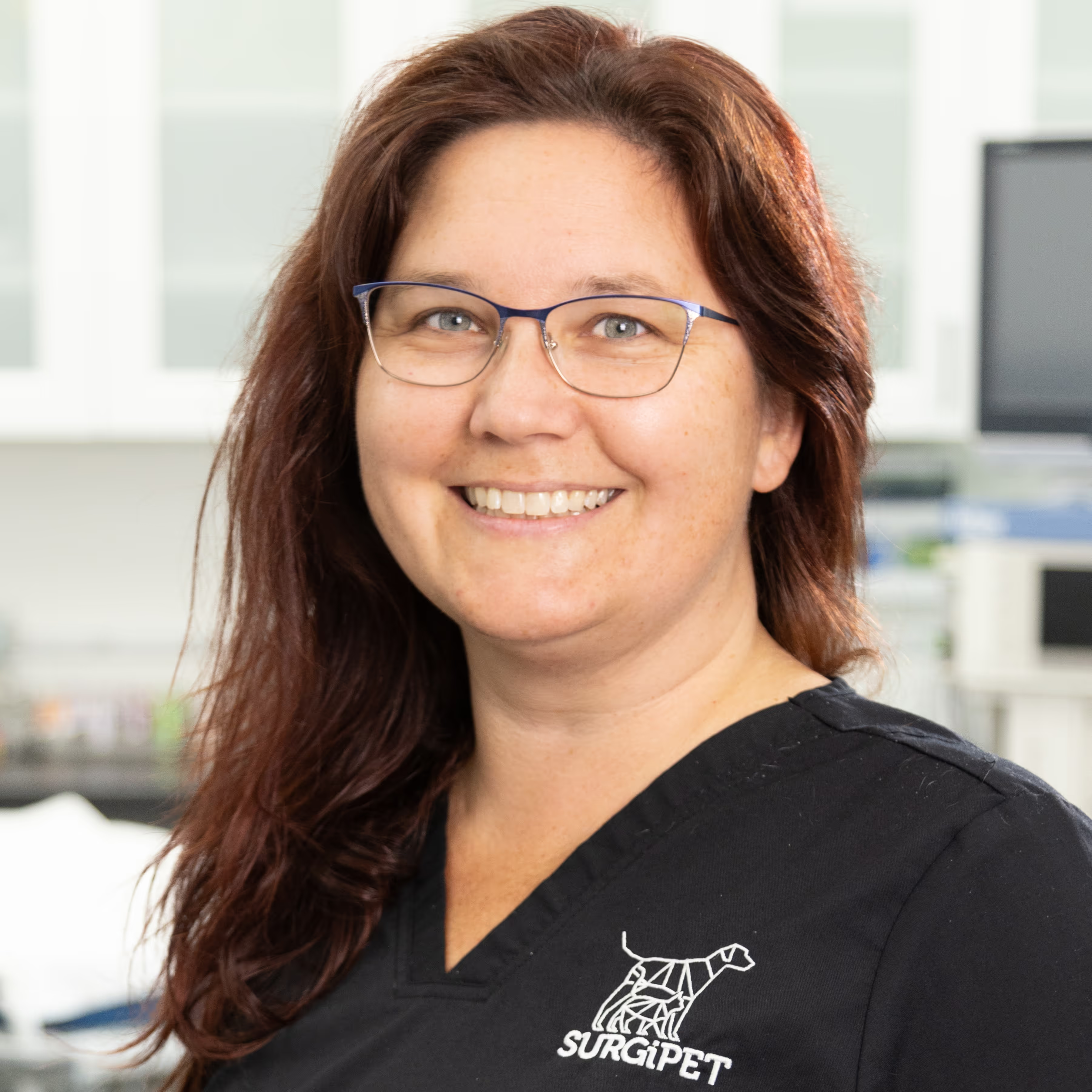
Amber has over two decades of experience as a Registered Veterinary Technician. One of her greatest joys is mentoring and training newer staff, sharing the passion for veterinary care that has driven her throughout her career.
Amber is a Registered Veterinary Technician and our Nursing Director, bringing more than 20 years of experience in veterinary medicine to our team. Most of Amber’s career has been spent in emergency and intensive care, where she developed strong skills in critical patient management, anesthesia, and team leadership. For the past two years, she has brought that expertise to our surgical center, where she focuses on ensuring a smooth experience for patients from admission through recovery and supporting our team in providing exceptional surgical nursing care.
Amber is passionate about creating a positive, collaborative environment for both her team and our clients. She believes that every patient deserves individualized, compassionate care and takes pride in building trust with the families who bring their pets to us. She also enjoys mentoring veterinary professionals and helping others grow within the field.
Outside of work, Amber loves spending time with her family and many pets, traveling in their RV, and curling up with a good book.
Avoid the Guessing Game!
Let SurgiPet Doctors Tell You if Surgery is Necessary

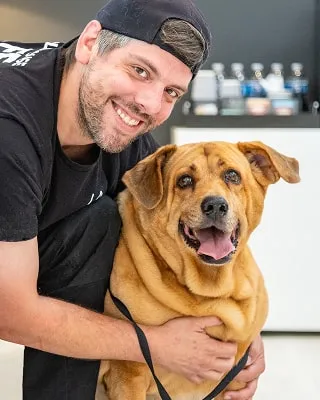
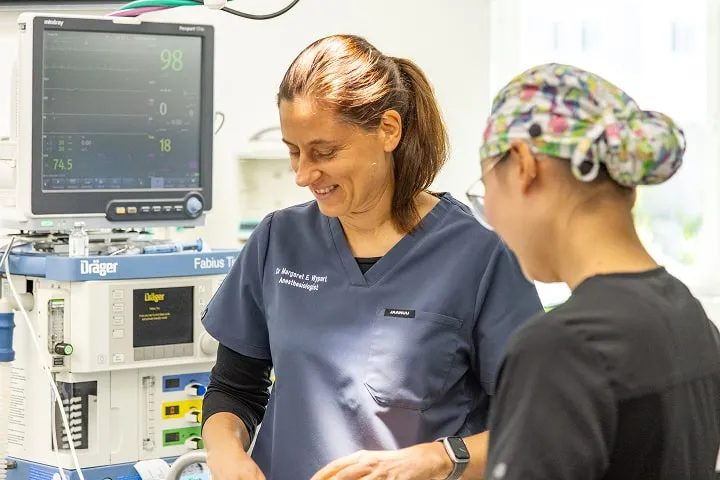

Ready to Give Your Pet the Best Care?
Schedule a consultation today and see why thousands of pet owners choose us.
Book in Just Minutes
Simple and hassle-free scheduling for your convenience.
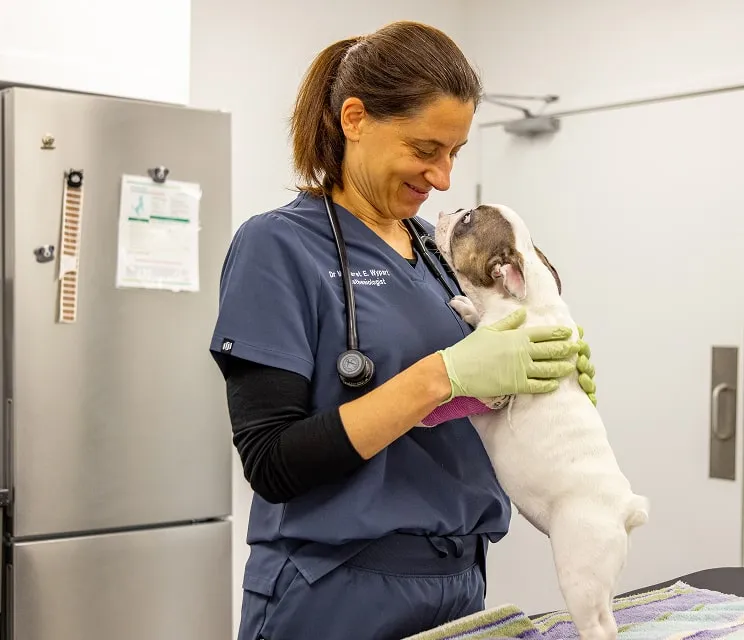
Have Questions? We’re Here to Help!

There’s a difference in the level of care that you’ll get at SurgiPet. While general clinics may perform surgeries among other tasks, we focus on surgery only - with an experienced surgeon, a board-certified anesthesiologist, and the latest equipment and technology.
You’ll also get clear, upfront pricing and dedicated post-operative support, available 7 days a week, including weekends.
Yes! If our surgeon determines that surgery is needed, we can often perform it the same day. Your pet will come in for the consultation, have surgery, and go home the same day. Just let our staff know you’re interested in this option when booking your consultation.
Some tell-tale signs that your dog has trouble with a dislocated kneecap are: “skipping” or “hopping” gait: a little skip in steps (the pet will limp for a few steps and then quickly return to normal), stiffness of a back leg, stiff walking, and episodes of running on three legs, holding one back leg up.
A popping sound can sometimes be heard when the kneecap returns to its proper position. In severe cases the pet will refuse to walk on the affected leg at all times.
This health issue has a higher incidence rate among the following dogs: Affenpinscher, Brussels Griffon, Chihuahua, Poodle, Pug, Shih Tzu, English Toy Spaniel, Japanese Spaniel, Greyhound, Maltese, Miniature Pinscher, Papillon, Pekingese, Pomeranian, Manchester Terrier, Silky Terrier, and Yorkshire Terrier.
In around half of these cases both kneecaps of the dogs are affected, while the other half usually only suffer with one.
Recovery following the MPL surgery is relatively short. It takes about 4 weeks for the bone to heal and an additional 4 weeks (for a total of 8 weeks) before the pet can resume regular, unrestricted activity.
Yes, MPL surgery has a very high success rate in improving comfort, restoring mobility, and preventing long-term joint damage.
Statistically, following MPL surgery, over 90-95% of the dogs regain regular or near-regular leg use.
If medial patellar luxation (MPL) is not fixed through surgery, especially in moderate to severe cases, complications can develop. Your dog may have worsening lameness, more frequent limping, and increased pain as the kneecap continues to dislocate.
This misalignment can lead to joint damage and irreversible arthritis, causing chronic pain. Muscle loss may occur as the leg weakens, further limiting mobility and affecting quality of life. Fixing MPL can prevent these issues and improve your dog’s comfort and activity levels.
Dog MPL surgery often costs $6,000–$8,000 at large hospitals in Southern California. At SurgiPet, our $4,190 flat fee (2025) covers all standard surgical costs - consults, anesthesia, board-certified anesthesiologist’s fees, OR, surgeon’s fee - plus extras often billed separately elsewhere, including:
- Pain meds, sedative, antibiotics, anti-nausea meds (for the first 2 weeks)
- Support sling to help your dog walk during early recovery
- All rechecks & X-rays for 4 months
- Sedation for X-rays if needed
- Pre-op bloodwork and chest films (if needed)
- Live C-arm X-ray imaging during surgery
Not included: medications beyond two weeks (sedatives), surgical complications, physical therapy, or rechecks beyond 4 months.
You’ll meet with both the surgeon and anesthesiologist in person to review the plan and ask any final questions. Your dog’s surgery is performed in a modern operating room under the highest standards of sterility.
An anesthesiologist monitors your pet throughout, using advanced equipment and multimodal pain control. After surgery, your pet recovers in a quiet area under direct supervision. Most dogs are ready to go home by the evening - fully awake, comfortable, and sent home with meds, a support sling, and clear, personalized care instructions.


